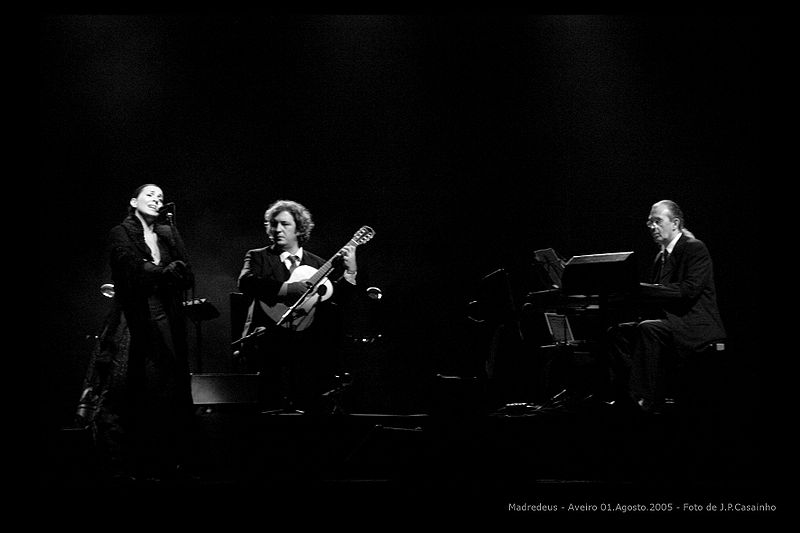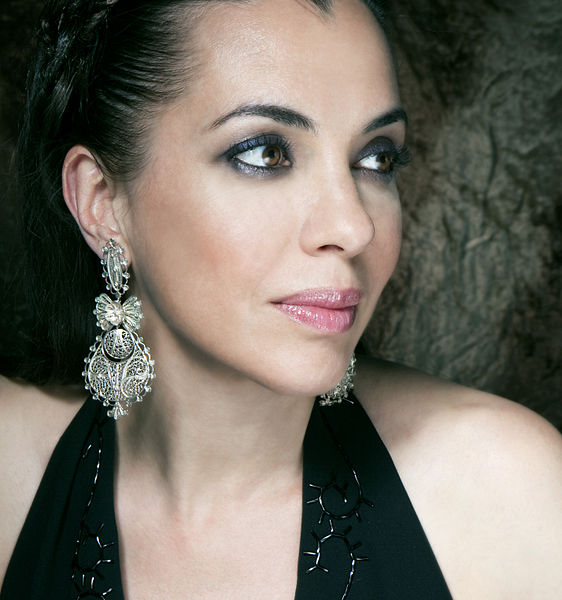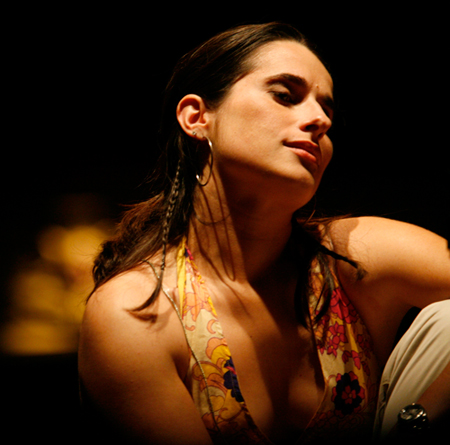<Back to Index>
- Folk Music Band Madredeus, 1987
- Singer Cristina Branco, 1972
PAGE SPONSOR


Madredeus is a Portuguese band. Their music combines traditional Portuguese music (many times erroneously associated with the subgenre of Fado) with influences of modern folk music. The lyrics are often melancholic and related to the sea or traveling or absence, continuing a tradition of songs that dates back to Medieval times (with obvious relations to cantigas de amigo among others).
The band's founding members were Pedro Ayres Magalhães (classical guitar), Rodrigo Leão (keyboard synthesizer), Francisco Ribeiro (cello), Gabriel Gomes (accordion) and Teresa Salgueiro (vocals). Magalhães and Leão formed the band in 1985, Ribeiro and Gomes joined in 1986. They had been searching for a female singer, and found Teresa Salgueiro in one of Lisbon's night clubs. Teresa liked their music and agreed to join, so in 1987 Madredeus recorded their first album, Os dias da Madredeus.
The first album was recorded in their rehearsal space, a disused abbey in Lisbon. The recording was especially strenuous due to deafening interruptions every 5 minutes from Lisbon's tram service, which ran directly above. In honor of this unavoidable presence in their every performance, they named themselves after the line's nearby terminus, Madre de Deus (Mother of God), shortened to the vernacular Madredeus.
In 1993, Pedro Ayres Magalhães left the band temporarily and was replaced in live concerts by José Peixoto (classical guitar). Magalhães rejoined the group later, making it a sextet with two guitarists.
They released several albums and became very popular in Portugal, but remained relatively unknown outside the country. This changed in 1994 when Wim Wenders, impressed by their music, asked Madredeus to perform in his movie Lisbon Story - the soundtrack gave the band international fame. Madredeus consequently toured Europe, South America, Africa and Asia.
In 1994 Rodrigo Leão left the band to start a solo career, being replaced by Carlos Maria Trindade (keyboard synthesizer).
In 1997 Francisco Ribeiro and Gabriel Gomes left the band as Madredeus' style started abandoning its fado roots with the release of O Paraíso. At this time Fernando Júdice (Acoustic bass guitar) was invited to join them, to form the current lineup, again a quintet. Madredeus has sold over 3 million albums worldwide.
In 1998 Madredeus contributed "Os Dias São A Noite (Suso Saiz Remix)" to the AIDS benefit compilation album Onda Sonora: Red Hot + Lisbon produced by the Red Hot Organization.
In November 2007 Teresa Salgueiro announced she had left Madredeus.
Former member and co-founder Francisco Ribeiro released his first solo album Desiderata: A Junção do Bem in 2009. He died on September 14, 2010 from cancer.
Rodrigo Leão is a Portuguese musician and composer. He was born in Lisbon in 1964. He became known for his musical compositions and participation in Portuguese bands such as Madredeus and Sétima Legião.
He co-founded the band Sétima Legião in 1982 and Madredeus in 1985. As his solo career began to take shape, he chose to suspend his participation with the respective bands in 1993 and 1994.
His solo work explores a combination of modern - classic compositions with more traditional song format and instrumentation. Several artists have participated in both his records and tours, such as Lula Pena or Adriana Calcanhotto in Alma Mater and Beth Gibbons and Ryuichi Sakamoto in Cinema.
His album, Cinema, was very successful in the Portuguese market, reaching #1 in sales and its promotion concerts in Portugal and Spain were frequently sold out. In this album, the eclectic roots of his music and the influence of cinema can be appreciated.
Ana Vieira is the new member of the group providing the vocals. Neil Hannon participated in the album A Mãe of Rodrigo Leão and Cinema Ensemble.
In
2007 he composed the original soundtrack for the documentary serie
Portugal, Um Retrato Social directed by António Barreto for RTP,
the public Portuguese television channel. With 18 songs based in his
last work he went on the tour Os Portugueses.
Francisco Ribeiro (March 15, 1965 - September 14, 2010) was a Portuguese cellist, composer, lyricist, vocalist, arranger and record producer. He was born in Lisbon, Portugal.
Ribeiro is best known for being one of the founding members of Madredeus, a group that combined traditional Portuguese music with influences from contemporary folk music. In 1997, he left Madredeus to complete his musical training in England. He returned to Portugal in 2006. In December 2009, he released The Junction Well, the first album by his personal project Desiderata.
While in England, Ribeiro was a member of the Gloucester and Stroud Symphony Orchestras from 2002 through 2003. He graduated from Bath Spa University in Music and Composition, and also studied at Gloucester Tech College while attending the Music Academy of Santa Cecilia.
Ribeiro also collaborated on the soundtrack for the 1994 film Lisbon Story, directed by Wim Wenders, and was actively involved in various music projects and festivals.
Ribeiro died in Lisbon from liver cancer at the age of 45.
Teresa Salgueiro (also spelled as Tereza Salgueiro) (born Lisboa, 8 January 1969) is a Portuguese singer. She is best known as the lead singer of Madredeus from 1987 until 2007.
As a young girl, Teresa Salgueiro sang the traditional Portuguese music Fado and Brazilian bossa nova in the streets and taverns of Lisbon. She moved to old Lisbon to live with friends at the age of 16 and continued her singing.
Salgueiro met guitarist and producer Pedro Ayres Magalhães in 1987 and formed Madredeus together with Francisco Ribeiro on cello, Gabriel Gomes on accordion and Rodrigo Leão on keyboards. The band has been together since 1987, recording 11 albums released through record companies such as Blue Note Records, Nettwerk and EMI Records, all subsidiaries of EMI. Madredeus has also played throughout the world.
Teresa Salgueiro played a prominent part in the 1994 Wim Wenders' Lisbon Story (Viagem a Lisboa) together with Magalhães. Salgueiro and Magalhães recorded the soundtrack with Madredeus, released as Ainda in 1994.
Salgueiro has sung on albums by Carlos Nuñez and António Chainho released in 2000.
In November 2005 Teresa Salgueiro edited her first CD (Obrigado), with the participation of other musicians such as Caetano Veloso, Carlos Núñez, José Carreras and Angelo Branduardi. She is currently one of Portugal's most acclaimed singers.
In 2009 she changed the spelling of her artistic name to Tereza Salgueiro (now with a z) and edited her album Matriz (Matrix).


Cristina Branco (born 1972 in Almeirim, Ribatejo, Portugal) is a Portuguese musician.
Branco was originally drawn to jazz and forms of Portuguese music before finally opting for fado after being introduced to the music of Amália Rodrigues by her grandfather. Branco studied the poems from which major fado lyrics are taken. Branco continues to work on her fado repertory, accompanied by Custódio Castelo on guitar and as composer.